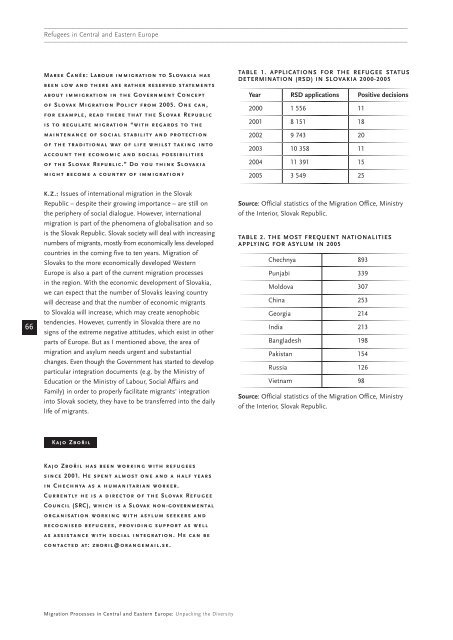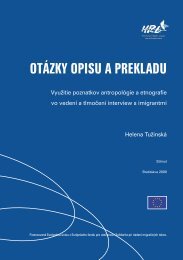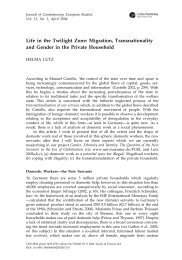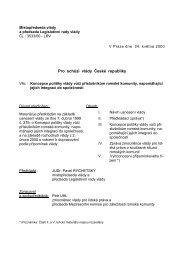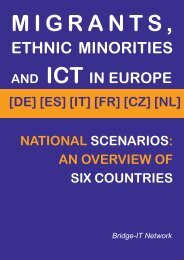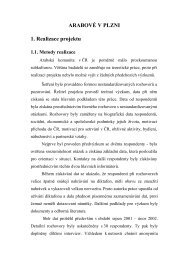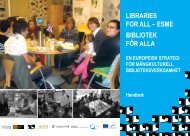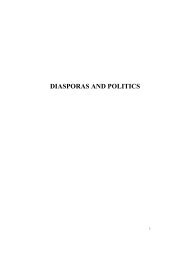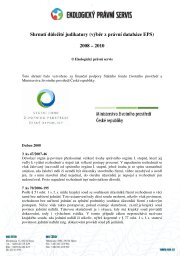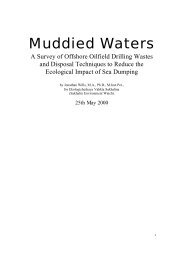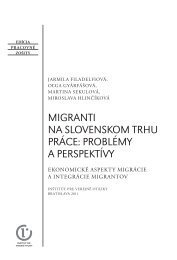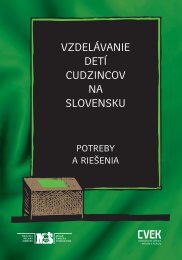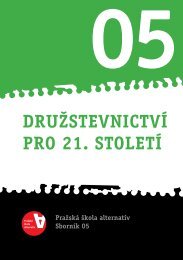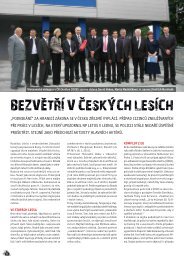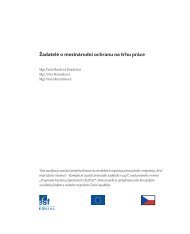Migration Processes in Central and Eastern Europe - Multiple Choices
Migration Processes in Central and Eastern Europe - Multiple Choices
Migration Processes in Central and Eastern Europe - Multiple Choices
Create successful ePaper yourself
Turn your PDF publications into a flip-book with our unique Google optimized e-Paper software.
———————————————————————————————————————————————————————————————<br />
Refugees <strong>in</strong> <strong>Central</strong> <strong>and</strong> <strong>Eastern</strong> <strong>Europe</strong><br />
———————————————————————————————————————————————————————————————<br />
Marek Čaněk: Labour immigration to Slovakia has<br />
been low <strong>and</strong> there are rather reserved statements<br />
about immigration <strong>in</strong> the Government Concept<br />
of Slovak <strong>Migration</strong> Policy from 2005. One can,<br />
for example, read there that the Slovak Republic<br />
is to regulate migration “with regards to the<br />
ma<strong>in</strong>tenance of social stability <strong>and</strong> protection<br />
of the traditional way of life whilst tak<strong>in</strong>g <strong>in</strong>to<br />
account the economic <strong>and</strong> social possibilities<br />
of the Slovak Republic.” Do you th<strong>in</strong>k Slovakia<br />
might become a country of immigration?<br />
TABLE 1. APPLICATIONS FOR THE REFUGEE STATUS<br />
DETERMINATION (RSD) IN SLOVAKIA 2000-2005<br />
Year RSD applications Positive decisions<br />
2000 1 556 11<br />
2001 8 151 18<br />
2002 9 743 20<br />
2003 10 358 11<br />
2004 11 391 15<br />
2005 3 549 25<br />
66<br />
K.Z.: Issues of <strong>in</strong>ternational migration <strong>in</strong> the Slovak<br />
Republic – despite their grow<strong>in</strong>g importance – are still on<br />
the periphery of social dialogue. However, <strong>in</strong>ternational<br />
migration is part of the phenomena of globalisation <strong>and</strong> so<br />
is the Slovak Republic. Slovak society will deal with <strong>in</strong>creas<strong>in</strong>g<br />
numbers of migrants, mostly from economically less developed<br />
countries <strong>in</strong> the com<strong>in</strong>g five to ten years. <strong>Migration</strong> of<br />
Slovaks to the more economically developed Western<br />
<strong>Europe</strong> is also a part of the current migration processes<br />
<strong>in</strong> the region. With the economic development of Slovakia,<br />
we can expect that the number of Slovaks leav<strong>in</strong>g country<br />
will decrease <strong>and</strong> that the number of economic migrants<br />
to Slovakia will <strong>in</strong>crease, which may create xenophobic<br />
tendencies. However, currently <strong>in</strong> Slovakia there are no<br />
signs of the extreme negative attitudes, which exist <strong>in</strong> other<br />
parts of <strong>Europe</strong>. But as I mentioned above, the area of<br />
migration <strong>and</strong> asylum needs urgent <strong>and</strong> substantial<br />
changes. Even though the Government has started to develop<br />
particular <strong>in</strong>tegration documents (e.g. by the M<strong>in</strong>istry of<br />
Education or the M<strong>in</strong>istry of Labour, Social Affairs <strong>and</strong><br />
Family) <strong>in</strong> order to properly facilitate migrants' <strong>in</strong>tegration<br />
<strong>in</strong>to Slovak society, they have to be transferred <strong>in</strong>to the daily<br />
life of migrants.<br />
Source: Official statistics of the <strong>Migration</strong> Office, M<strong>in</strong>istry<br />
of the Interior, Slovak Republic.<br />
TABLE 2. THE MOST FREQUENT NATIONALITIES<br />
APPLYING FOR ASYLUM IN 2005<br />
Chechnya 893<br />
Punjabi 339<br />
Moldova 307<br />
Ch<strong>in</strong>a 253<br />
Georgia 214<br />
India 213<br />
Bangladesh 198<br />
Pakistan 154<br />
Russia 126<br />
Vietnam 98<br />
Source: Official statistics of the <strong>Migration</strong> Office, M<strong>in</strong>istry<br />
of the Interior, Slovak Republic.<br />
Kajo Zbořil<br />
Kajo Zbořil has been work<strong>in</strong>g with refugees<br />
s<strong>in</strong>ce 2001. He spent almost one <strong>and</strong> a half years<br />
<strong>in</strong> Chechnya as a humanitarian worker.<br />
Currently he is a director of the Slovak Refugee<br />
Council (SRC), which is a Slovak non-governmental<br />
organisation work<strong>in</strong>g with asylum seekers <strong>and</strong><br />
recognised refugees, provid<strong>in</strong>g support as well<br />
as assistance with social <strong>in</strong>tegration. He can be<br />
contacted at: zboril@orangemail.sk.<br />
<strong>Migration</strong> <strong>Processes</strong> <strong>in</strong> <strong>Central</strong> <strong>and</strong> <strong>Eastern</strong> <strong>Europe</strong>: Unpack<strong>in</strong>g the Diversity


